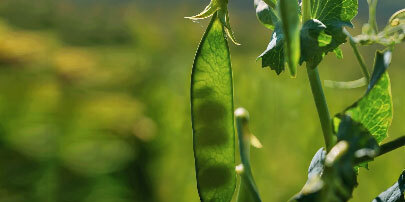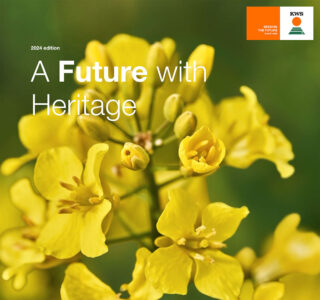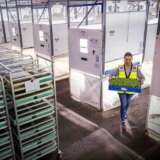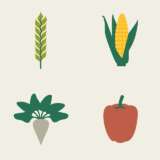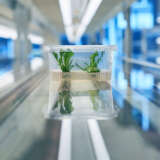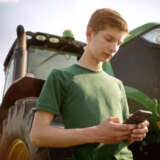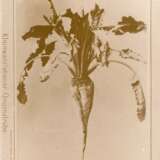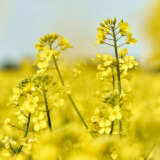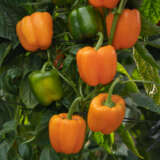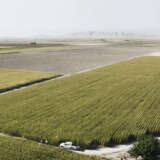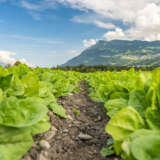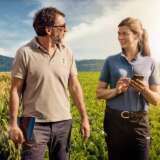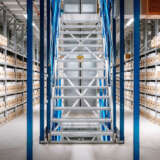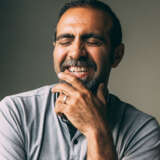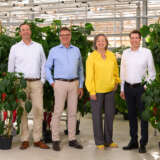Interview with KWS Executive Board member Peter Hofmann
“Foresight is our daily business”
The growing world population requires steadily increasing yields, even though the amount of arable land is stagnating. At the same time, the high expectations society and politicians hold around food production are evident in ambitious targets for the reduction of fertilizer and plant protection. Consequently, farmers find themselves in a challenging environment. What does this mean for plant breeding? How can KWS help farmers master these complex changes? And what is the company doing to hold fast to its targets and promote profitable growth amid these changes? Executive Board member Dr. Peter Hofmann provides insight in an interview.
Mr. Hofmann, agriculture is undergoing constant change. What contribution can plant breeding make?
Plant breeding plays a key role in solving the challenges global food systems are facing. KWS is aware of this responsibility, and we see it as our goal to develop high-performance varieties that further increase agricultural yields under difficult conditions while simultaneously conserving resources. The basis for this is our forward-thinking research and breeding work, in which we invest a significant proportion of our turnover every year – around 326 million euros in the last financial year.
What is KWS focusing on specifically?
Increasing yield is still the top priority in developing new varieties. But at the same time, there is also an increased focus on resistance breeding and protection against diseases and pests. In order to meet the growing demand for healthy and sustainable food, we are also increasing the proportion of KWS varieties for direct use in human nutrition. Following the entry into vegetable breeding and initial projects in the field of “plant-based proteins,” the topic will certainly continue to gain relevance.
Are you observing any other trends in agriculture?
Agricultural work is becoming ever more complex. Whether new technologies, regulatory requirements, global commodity prices, marketing or extended crop rotations, farmers have to be in the know about so many things and take multiple factors into account. As a result, they have to think more in terms of supply chains and explore new value creation opportunities.
Our core competence as KWS is and will remain breeding innovative varieties and producing and selling high-quality seed.
Peter Hofmann | KWS Executive Board member responsible for Sugarbeet, Vegetables, Cereals, Oilseed Rape/Special Crops & Organic Seeds and Marketing & Communications
Is this development reflected in the KWS business model?
Our core competence at KWS is, and always will remain, breeding innovative varieties and producing and selling high-quality seed. We have been very successful at this for almost 170 years. In addition to our diverse portfolio, we also support customers with our expertise: As a ”seed partner,“ we provide holistic and cross-crop advice on many of the complex challenges farmers face. We also take a holistic view of the agricultural value chain in product development and create added value beyond the seed – for example through intelligent tools or innovative concepts for animal feed.
It takes an average of ten years for a new variety to find its way onto the market: plant breeding is a lengthy process. At the same time, external conditions are changing rapidly. How do we deal with this contrast as a company?
As plant breeders, we look far into the future, making strategic investments today that aim to deliver success in 10 to 20 years. Current innovations such as CONVISO® SMART and CR+, whose development we initiated in the early 2000s, are a good example. There’s a good reason why foresight is our daily business and a core value at KWS. In order to sharpen our focus on future requirements for our seeds, we seek closeness to farmers from all markets and incorporate their individual experiences.
Philip von dem Bussche
† April 08, 2024
Valuing closeness
One person who lived the value of “closeness” was Philip von dem Bussche. As a long-standing member of the Executive Board and most recently Chairman of the Supervisory Board, he shaped KWS’s development for over 25 years. He passed away in April 2024 at the age of 74 after a serious illness. “Philip von dem Bussche not only had in-depth knowledge of the agricultural sector, he was also passionate about agricultural practice. But I found his greatest strength to be his approachability and down-to-earth attitude,” recalls Peter Hofmann. “He was genuinely interested in his fellow human beings and always communicated on an equal footing. With his death, KWS lost a great expert and an impressive personality – and I personally lost a role model and person who made a significant impact on me.”
Closeness – another core KWS value …
Exactly. Only if we recognize trends in good time can we start developing varieties today that will offer added value in the future. To do so, we need to be close to the farmers and their needs. For us, closeness means personal interaction on the farm, but also connecting with our customers digitally.
Let’s take a look at the economic development in fiscal year 2023/24, in which KWS generated net sales of 1.68 billion euros. How do you view the result?
We can look back on a very successful financial year in a challenging market environment. In the sugarbeet segment, we achieved record sales of over 860 million euros. As expected, cereals and oilseed rape also performed very well, leading to an increase in segment sales of almost 12% from 247 to 276 million euros. In corn, we fell short of our plans, mainly due to weak business in North America. The sale of our corn business in South America and China represents an important milestone. The latter took place against the backdrop of changed regulatory conditions in China and contributed approx. 28 million euros to the segment result of 39 million euros. In the new vegetables business division, whose sales are
currently being driven by our strong spinach and bean portfolio, we have continued to expand our breeding activities for tomatoes, cucumbers, peppers, watermelons and melons. In a few years, we will launch our first own varieties, but there is still a long way to go before we become a significant market player in this segment (further information on the segment results).
You mentioned a challenging market environment. What external factors shaped the financial year?
These include high interest rates, inflation and hyperinflation in Argentina and Turkey, as well as a long phase of high commodity prices, which has led to a rise in production costs, particularly for corn and cereals. Like many farmers, we were also concerned about the climate: Heavy rainfall and flooding in Europe presented us with logistical challenges and affected seed propagation as well as the availability of varieties. Geopolitical factors and conflicts as well as increasing protectionism also play a role worldwide and are likely to become even more relevant for our planning in the future.
Not only agriculture, but also plant breeding is subject to political regulation. What do the EU’s plans to deregulate “new breeding methods” mean for KWS?
New breeding methods such as genome editing are significant because they can be used to accelerate the integration of specific new traits – such as resistances – into high-performance varieties. They are an important tool in the breeder’s toolbox, especially since chemical solutions for pesticides are being discontinued. And finally, deregulation would strengthen the competitiveness of European plant breeding.
By exiting the highly competitive market for genetically modified (GM) corn seed in South America, we are strengthening our independence and gaining flexibility to focus even more strongly on our strategic future fields.
Peter Hofmann | KWS Executive Board
In March 2024, KWS announced the sale of its South American corn business – as you mentioned. What led to this step?
In South America, we built up a successful corn business within a short space of time and gained a considerable market share – most recently 10 percent in Brazil. In view of our ambitious strategic targets, most importantly, the increased focus on plant-based foods and higher profitability, we are certain that we have chosen the right time to take this step. By exiting the highly competitive market for genetically modified (GM) corn seed in South America, we are strengthening our independence and gaining flexibility to focus even more strongly on our strategic future fields. At the same time, we are confident that the purchaser, GDM, the family-owned Argentinian company and leading provider in the field of plant genetics, is a good partner (further information).
One of the future fields mentioned is the market for vegetable seed, in which KWS has been active since 2019. What goals have we set ourselves here?
While our entry into vegetable breeding is bold, it is the right step which we are able to take thanks to our family-oriented shareholder structure. It enables us to diversify our portfolio and build our business on additional pillars. The long-term goal is to become a significant player in the market, which, given the trend towards sustainable and healthy nutrition, offers good growth prospects. Our approach is based on three pillars: Organic growth through the development of our own breeding activities, the sale of licensed-in varieties, and targeted acquisitions.
How far has the business unit progressed towards these goals and what are the next steps?
Developing the business unit is a long-term process and we have taken the first important steps. In addition to acquiring Pop Vriend Seeds and Geneplanta S.r.l., we have built up an entirely new network of 10 breeding and research locations in the Netherlands, Spain, Turkey, Italy, Brazil and Mexico. The structural development has been completed in many areas: Now we are fully active in breeding.
What other goals has KWS set itself for the future?
Our portfolio has grown continuously in recent years, which increases the importance of a clear focus on our strategic targets. In addition to expanding the vegetable segment, we are also focusing on further strengthening sugarbeet cultivation through innovations, establishing hybrid crops for barley and wheat, and driving forward the development of high-quality hybrid potato seed. The basis for KWS’s current and future success is the high quality of our products. This is why we will continue to invest in research and development in the long term and thus in our ability to innovate. This is what “Seeding the future for generations” means for us.
Looking at innovations that are already on the market, what developments are shaping the current portfolio?
In the sugarbeet segment, CONVISO® SMART, an innovative system for weed control, and our CR+ varieties with Cercospora resistance stand out. In the cereals segment, our hybrid rye varieties, which are the result of a continuous breeding progress, are very successful. And thanks to PollenPLUS® technology, they are highly resistant to ergot. Our innovative oilseed rape portfolio has established itself as another important pillar for the cereals segment. Our winter oilseed rape varieties with InsectPROTECT, i.e., genetic protection against the larvae of the cabbage-stem flea beetle, are a further milestone (further information). Thanks to our high-performance products, we are the European market leader in silage corn. And in sunflower, which is still a young crop for us, we have our first high-quality products on the market – another important addition to our portfolio for crop rotation.
What has always motivated me, is developing young people at KWS and seeing how they have grown over the years and how they will further shape KWS with their expertise and develop it in the future.
Peter Hofmann | KWS Executive Board
Last but not least, a personal question: You will be taking your well-deserved retirement in September 2025, after over 10 years as an Executive Board member and more than 30 years with the company. What development particularly impressed you during this time?
Two things come to mind. First, the success story of sugarbeet, which today contributes significantly to the company’s success with a turnover of 865 million euros. Thanks to many years of teamwork and foresight, we have been very successful in developing innovations and converting them into market shares. Secondly, and what has always motivated me, is developing young people at KWS and seeing how they have grown over the years and how they will further shape KWS with their expertise and develop it in the future.
